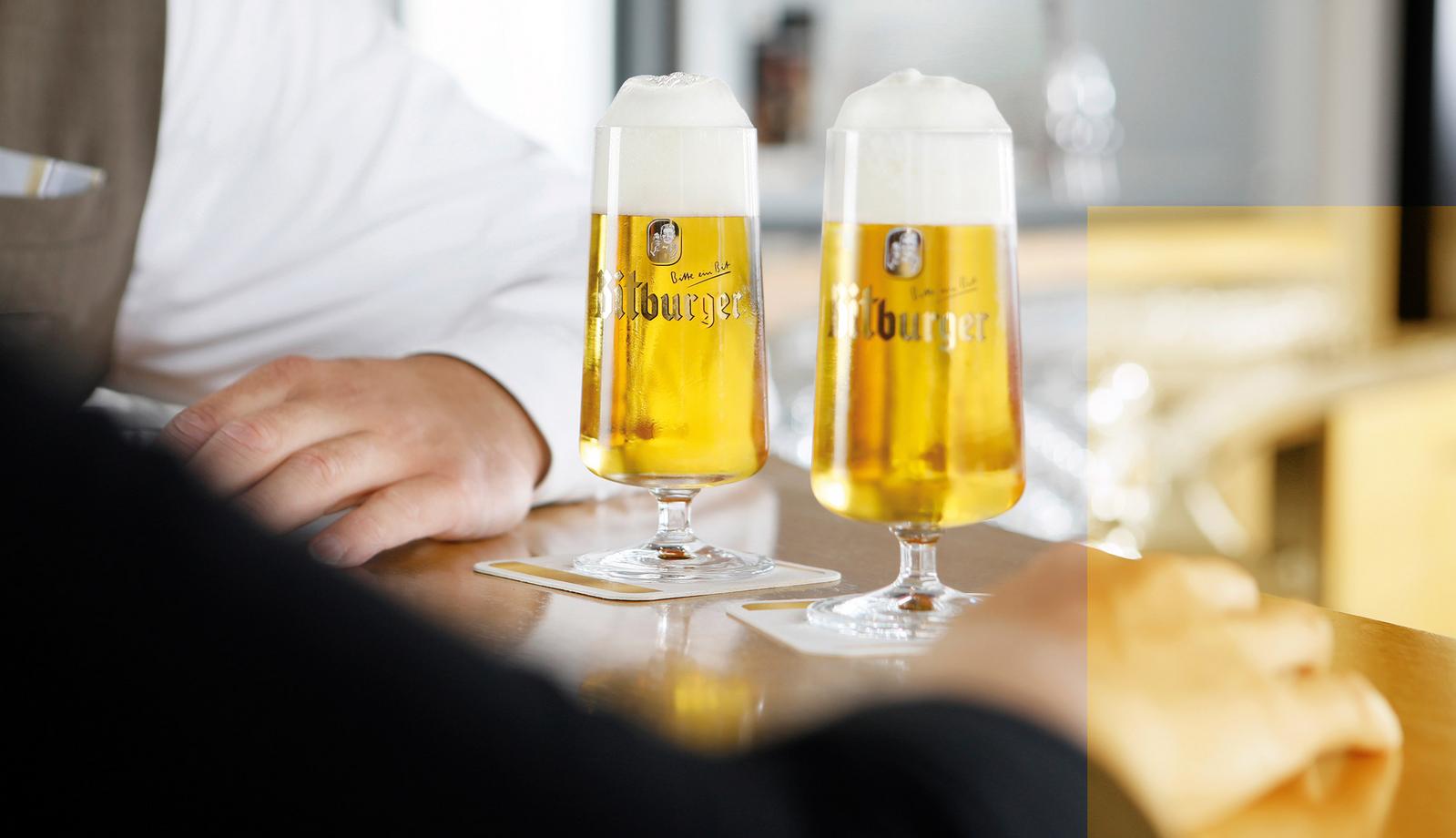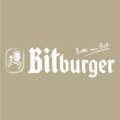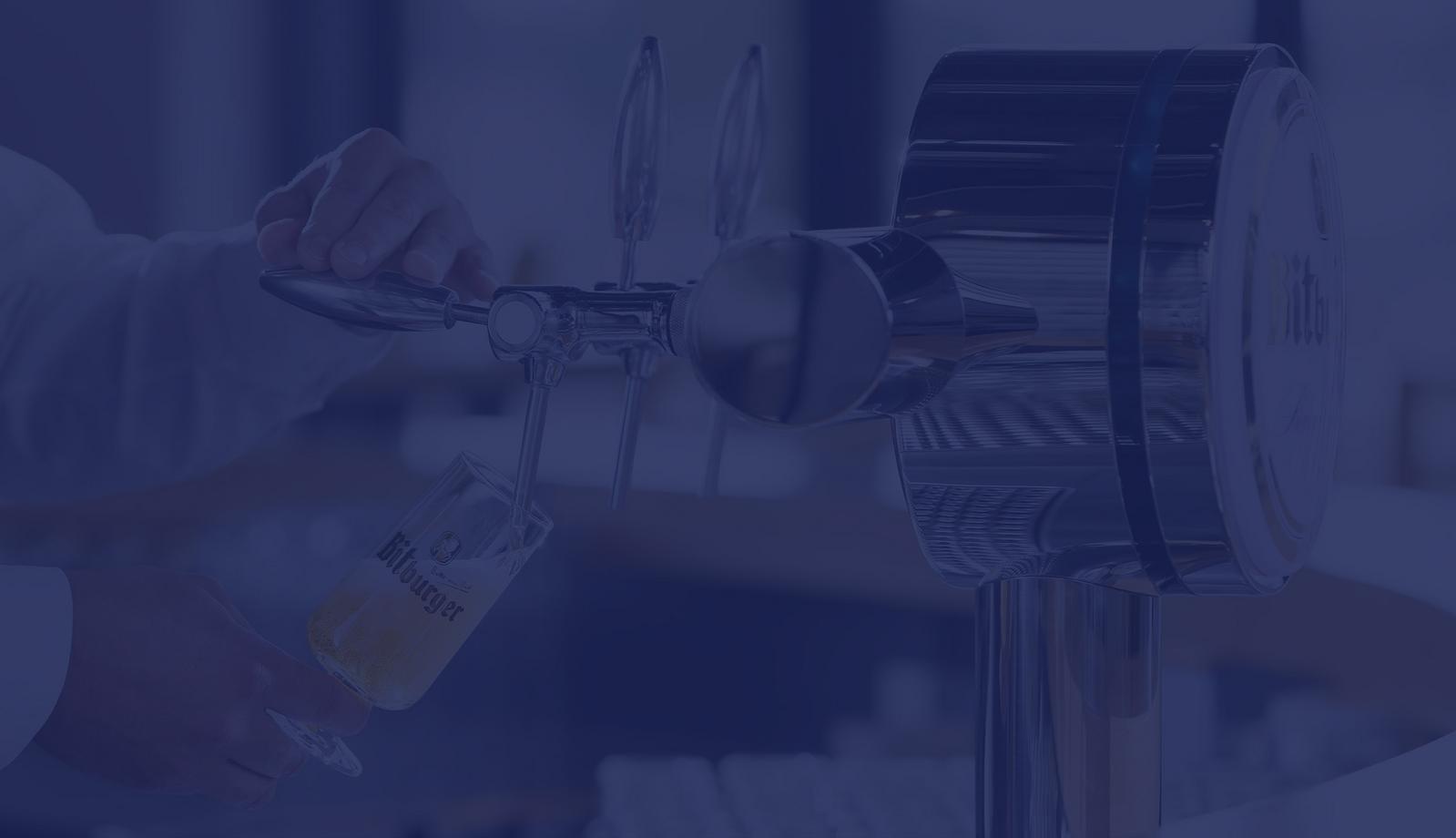

Bitburger – eLearning course for a perfectly pulled beer
Ensuring high-quality bar service despite staffing shortages
The Bitburger Brewery Group is one of Germany’s top three breweries in terms of sales. Over 30,000 bars, restaurants and hotels worldwide serve their customers the group’s premium beers, including Bitburger, which has been Germany’s number one draft beer brand for decades.
Unlike serving bottled beer, pulling the perfect draft beer calls for a good deal of know-how about everything from the tap system to storage, logistics and hygiene. Given the huge staffing shortages and the extremely high employee turnover since the outbreak of the COVID-19 pandemic, however, the industry is wondering how on earth it can continue transferring this knowledge.
Training solution with VR elements relating to bartending
To support the catering industry in this tricky situation, the Bitburger Brewery Group decided to digitalize and expand its existing training program. The aim was to make it possible to onboard service employees quickly and easily for free using the “bartending technique” eLearning course so that every catering business can ensure its high-quality bar service, even in difficult times.
In close and trusting collaboration with the tts learning architects, an eLearning course that is unique in the industry was created in just a few months, answering all the key questions relating to beer and bartending in five sections. For example, learners find out how barrels need to be stored, what they need to consider when changing a barrel, how to clean glasses and the tap system properly, and how to pull a perfect beer.
What makes this course special is the way knowledge is transferred. In order to quickly achieve sustainable learning outcomes, the learning experts at tts opted for a content mix combining video tutorials and quizzes with gamified VR elements. For example, one of the technical highlights of the eLearning course is an interactive tour of a cooling room simulated in 3D in real time.
Seamlessly interlinking the different media and enhancing their educational value has created a varied learning mix that is fun and encourages users to carry on learning. Learners who answer at least 80 percent of the questions correctly in the final quiz receive a certificate.

The eLearning platform is a real help to our catering businesses, enabling them to tackle high staff turnover with sustainable and effective training. The main benefits are time and cost savings, along with the practical nature of the learning sessions. In no time at all, even new service employees can maintain the premium quality level of our beer.

Rapid project progress thanks to hybrid approach
Seamless integration of existing content – a technical and educational challenge
Given the specified budget and its commitment to delivering premium quality, the Bitburger Brewery Group opted for a hybrid model. For example, it started by setting the course for the entire project, adopting an agile approach. The experience gained at this stage then served as the starting point for optimizing internal processes. This made it possible to kick-start and support subsequent series production as efficiently as possible from the outset.
Following the project kickoff, the tts experts prepared a design concept describing the eLearning course’s layout and interactive design. Existing material such as training presentations, explanatory videos, video tutorials and images served as a basis for this. In addition, all the objects required in the virtual space were defined and photos were provided for 3D modeling for the virtual cooling cellar.
To illustrate the concept, the tts learning architects prepared a prototype on which further content production was to be based. “We deliberately picked the demanding section with the virtual cooling cellar for the prototype, because the creative, educational and technical integration of the existing and new materials posed a particular challenge,” explains project manager Birgit Hisserich, Senior Quality Manager at the Bitburger Brewery Group. “Thanks to the committed teamwork of staff from both companies, however, everything ultimately worked together seamlessly,” she adds.
Merging content and adding sound with the tts performance suite
The tts learning experts then developed the storyboard for the eLearning course. This phase involved processing existing materials – editing videos, adapting image material and designing the 3D space, for instance. After that, all the content was merged in the tts performance suite’s authoring tool and sound was added on a temporary basis using the speech engine.
Implementing the three-dimensional, interactive beer cooling cellar proved technically challenging. After all, it had to simulate the original as realistically as possible while also ensuring high-performance operation, even without browser plugins. To achieve the ideal compromise between performance and level of detail, tts and Bitburger coordinated on a series of performance tests on the GastroPortal, with subsequent optimizations. Acceptance tests running in parallel with selected stakeholders helped optimize the new kind of immersive knowledge transfer and how everything was handled in the virtual space.
The Bitburger Brewery Group is more than satisfied with the outcome. “tts and the Bitburger Brewery Group worked together with mutual respect, patience and a high level of trust to develop an eLearning course with which we can both ultimately be really pleased,” says Hisserich.
What the Bitburger Brewery Group has achieved with the eLearning course
- Ensuring high-quality bartending in the catering industry, despite the high turnover of service personnel
- Supporting dynamic further development of service offerings for the on-premises market by maintaining and updating the eLearning course
- Acquiring a unique customer loyalty tool that is in keeping with the quality promise of all the brewery group’s brands
- Confirming the brewery group’s pioneering role and catering expertise, and helping to win new customers
Outlook
For the Bitburger Brewery Group, too, the eLearning course is an important step toward service digitalization. This offers potential that the group is looking to increasingly leverage in the future with a data-based approach. In January 2023, the brewery group therefore carried out a survey to ascertain the level of acceptance and the success of the project. The result of this survey will determine how and to what extent the digital service offering for the catering industry is to be expanded.
About the Bitburger Brewery Group
The roots of the Bitburger Brewery Group date back to the 16th century. The family company, which has now been in business for seven generations, currently has a workforce of around 1,600 employees at its headquarters in Bitburg and four further sites. With its brands Bitburger, Craftwerk Brewing, Kandi Malz, König Pilsener, Königsbacher, Köstritzer, Licher and Nette, the brewery group is one of Germany’s top three breweries in terms of sales. Its premium beers are exported to around 90 countries.
Tell us who you are and how we can support you in overcoming challenges and seizing opportunities.


